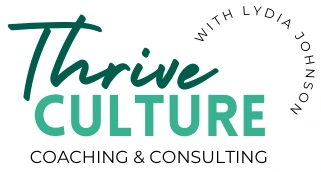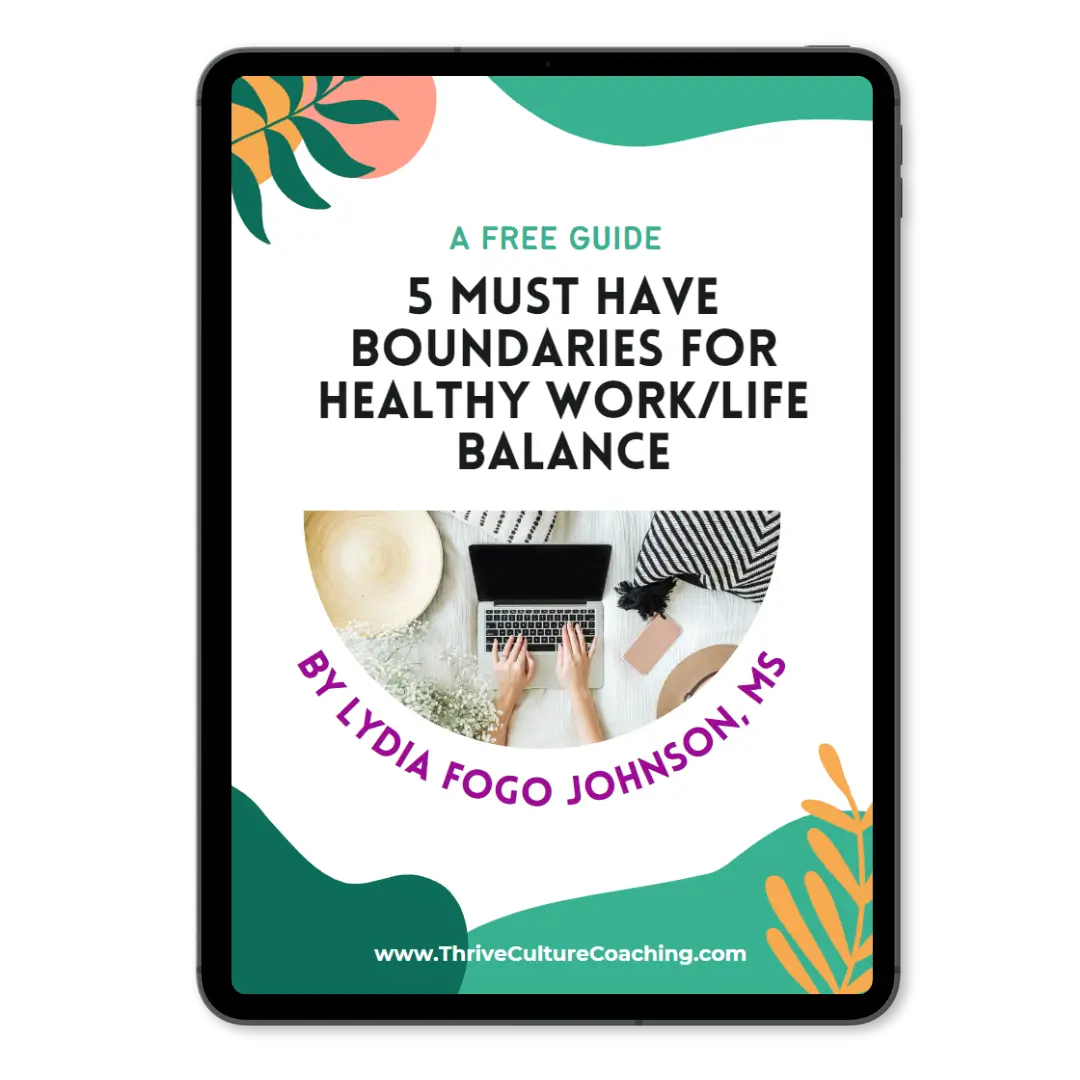Table of Contents
The Slack Clap That Broke Her
In a recent circle call inside my She Leads Well program, one of my clients shared something that stopped the group cold.
She had just wrapped a massive project — the kind of initiative that required months of strategic planning, coordination, and emotional labor. She shared the win in her company’s Slack channel.
And what did she get?
A few clapping emojis. That’s it.
She wasn’t looking for a trophy. But the silence hit harder than she expected. And it brought up a feeling many of us know all too well:
“Does anyone even see how hard I’m trying?”

Recognition isn’t about ego. It’s about feeling seen, valued, and human, especially when we’re pouring out so much of ourselves day after day at work.
If you’ve ever felt like your effort disappears into the void, this post is for you.
Let’s talk about why feeling unappreciated at work cuts so deep — and what you can do to address it without gaslighting yourself, over-explaining, or carrying more than your fair share of the emotional labor.
It’s Not “Needy” to Want Recognition — It’s Human
Let’s clear something up: Wanting to be appreciated at work doesn’t mean you’re fragile or fishing for compliments.
It means you’re human.
Recognition is one of the most basic — and most powerful — drivers of workplace well-being. Research from Gallup shows that employees who regularly feel appreciated are more engaged, more loyal, and way less likely to burn out.
And yet, many of us (especially women and marginalized professionals) are conditioned to believe that needing acknowledgment makes us “too much.” So instead of voicing our need for recognition, we keep our heads down and keep it moving — all while feeling more and more invisible.
Let’s stop normalizing that.
Your desire to be seen is not a flaw. It’s not vanity. It’s a real, research-backed need — and it deserves to be honored.
First, You Deserve Empathy
Before you try to fix the situation, take a moment to validate your feelings.
Feeling unappreciated at work can hit harder than you expect. Because it’s not just about the task that went unnoticed. It’s about the effort, intention, and care you put into something that felt important. When that’s met with silence, it can feel like you are being ignored—not just the work.
So first, give yourself permission to feel what you’re feeling. Frustration, sadness, resentment — it’s all valid. You’ve been showing up, doing your best, and holding a lot.
Acknowledging these feelings doesn’t make you needy or overly dramatic. Being human in a high-output environment is hard, and you deserve more than to be a ghost in your own workplace.
Start here:
- Name what you’re feeling
- Acknowledge what you’ve contributed
- Give yourself credit — even if no one else has yet
You can’t self-advocate or make thoughtful changes from a place of self-blame or shutdown. Empathy isn’t a detour. It’s the first step.
Where Recognition Can Come From
When you’re feeling invisible at work, it’s easy to assume the only way to feel appreciated is through your manager or a formal review process. But recognition — the kind that helps you feel seen and valued — can come from multiple directions.
Here are five key sources of recognition:
1. Your Boss or Leadership
This is the most obvious — and often most lacking — source. When done well, feedback from leadership makes you feel seen, valued, and supported.. Unfortunately, many managers struggle with giving consistent, timely recognition.
2. Your Peers and Colleagues

Sometimes, the people who understand your contributions best are those working right alongside you. A quick message, a sincere “thank you,” or spontaneous acknowledgment from a teammate can be incredibly validating, especially when it’s specific to something you did well.
3. Your Direct Reports
If you’re in a leadership role, you may forget that recognition is a two-way street. Positive feedback from your team can affirm your impact and remind you that your leadership matters.
4. Your Friends and Family
While they might not understand your industry, the people closest to you can still recognize your effort, growth, and dedication. You just need to let them in by sharing your wins and challenges with them.
5. Yourself
This one gets overlooked, but it’s the most consistent source you’ll ever have. Self-recognition isn’t self-indulgent. It’s necessary, especially when external validation is missing. It keeps you grounded in your purpose, allows you to celebrate your progress, and shields you from burnout.
Strategies to Increase Recognition (Without Feeling Awkward)
You shouldn’t have to “earn” the right to be appreciated. But in many work environments, recognition isn’t built into the culture. That means we sometimes have to create the conditions for it ourselves — thoughtfully and without compromising our self-respect.
These five strategies align with the five key sources of recognition. Each one is simple, sustainable, and designed to help you feel seen without feeling like you’re begging for attention.
1. With Your Boss: Share Wins First and Open Feedback Loops
Managers are busy people. So if you don’t go out of your way to share your accomplishments, the incredible work you’re doing behind the scenes can sometimes go unnoticed. This is especially true if you’re in a solo or cross-functional role, where your contributions aren’t always immediately visible to those outside your day-to-day circle.
Here’s an easy-to-implement habit that can shift that dynamic:
Kick off each 1:1 with a quick recap of your recent wins. Even just 2–3 bullet points can reframe the conversation and remind your manager of your impact. It also lays a subtle (but important) foundation for promotion conversations.
Then, open the door for more recognition with a thoughtful, professional prompt like:
“I’ve been thinking about how I stay engaged and where I do my best work. Something that’s really helpful for me is understanding what’s landing well and where I’m making an impact. Would you be open to weaving that into our check-ins more regularly?”
This is one of the most effective ways to spark more frequent, meaningful feedback from your manager. And with that comes something just as important: genuine appreciation of your contributions.
2. With Peers: Normalize Celebration and Ask for Support
Peer recognition can feel the most organic, but only if the culture supports it. The good news is, you can help create that culture with small, intentional moves.
Here are two worth trying:
First option: Start a wins-sharing tradition in your team space, like Slack or a recurring meeting. You can lead with:
“Hey, what’s something that went well for everyone this week? I’ll start…”
Modeling that it’s okay to share good news creates ripple effects. Over time, others will follow suit.
Second option: If you’ve got a trusted work bestie or close colleague, be direct:
“Hey, I just wrapped a huge deliverable and could really use a bit of a celebration moment. Can I brag for a sec?”
People often want to celebrate you — they just need the invitation.
3. With Direct Reports: Invite Upward Feedback
If you manage others, you’re probably used to giving recognition — not receiving it. But leadership can get lonely when no one reflects anything back.
That’s why it’s worth being intentional about inviting upward feedback. Try something like:
“I’m always working on growing as a leader — is there anything I’ve done recently that’s helped you feel more supported or clear?”
It’s a simple ask, but it sends a powerful message: feedback goes both ways. It creates a safe space for your team to speak up, makes you feel less invisible, and helps you stay grounded in your role.
4. With Friends & Family: Create a Recognition Ritual
Your people want to support you — they just might not know how. And if they’re not in your field, it’s easy for big work wins to go unnoticed.
The fix?
Make it easier to recognize your wins. Better yet, ritualize it:
- Around the dinner table, ask: “What’s something you’re proud of today?”
- During evening downtime, say: “Want to share a win from today before we crash?”
- With your partner or friend, make it a weekly text exchange: “What’s your Friday win?”
You’re not asking for fanfare — you’re inviting connection and reinforcing that your work, and theirs, is seen and valued beyond the job title.
5. With Yourself: Build a Daily Ta-Done Practice

Most of us are pros at noticing what hasn’t been done. Rarely do we pause to honor what we’ve completed.
End your day with a simple Ta-Done List:
- One task you finished
- One challenge you navigated
- One thing you’re proud of (yes, even if it was “kept my cool in that meeting” or “finally booked the dentist”)
As simple as this might seem, it’s one of the best ways to rewire your focus from deficiency to evidence. From pressure to progress.
Because when your inner critic pipes up with “What did I even do today?”, you’ll have a receipt.
(Feeling like you want to connect with yourself more? Check out this article on Faux Self-Care – and how to practice the real thing.)
Zooming Out: What Else Might Be Going On?
If you’re doing everything right — advocating for yourself, keeping track of wins, seeking out supportive people — and still feel chronically unseen or underappreciated, it might be time to zoom out.
Sometimes, deeper shifts are needed.
Here are a few reflection questions to help you explore what else might be contributing to the recognition gap:
1. Have I actually communicated my need for recognition?
It’s so common to assume others should just know — especially when we’re working hard and visibly contributing. But people are busy. Cues get missed. If you haven’t explicitly shared that you value feedback and acknowledgment, it might not be top of mind for others.
Ask yourself: “Have I been clear, or have I been hoping to be noticed without saying anything?”
2. Am I tapping into all sources of recognition — or relying on one?
Sometimes we hang all our hope on one person’s praise — usually our boss — and feel crushed when it doesn’t come. But that puts a lot of pressure on one channel.
Ask yourself: “Am I inviting recognition from peers, reports, friends, and myself — or expecting it only from above?”
3. Have I tangled my self-worth with my work performance?
This is a big one— and (unfortunately) all too common. When you’ve spent years tying your value to achievement, praise can feel like the only mirror you trust. Without it, you start to doubt your worth.
I work on this deeply with clients inside She Leads Well — especially high-performing women and working moms who’ve been trained to prove, achieve, and over-function.
Ask yourself: “If I didn’t get praised at all this week, would I still believe I mattered?”
4. Could my nervous system be filtering recognition through rejection sensitivity?
If you’re neurodivergent — especially if you have ADHD or identify as a Highly Sensitive Person — your brain may naturally be more attuned to social cues, emotional tone, and criticism. Mental health experts have a name for this: Rejection Sensitivity Dysphoria (RSD).
When you’re living with it, even a neutral comment or delayed response can feel like deep personal rejection, and one small piece of negative feedback can override 10 positive ones in your mind.
This isn’t being “too sensitive.” It’s just how your nervous system processes threat, safety, and belonging.
Ask yourself: “Am I missing the praise I am getting because my brain is wired to prioritize perceived rejection?”
This is something I work on often with my neurodivergent clients: learning to rewire the way we receive feedback and build internal safety, so recognition doesn’t feel so fragile or conditional.
5. Is this workplace capable of seeing me the way I want to be seen?
Let’s be real. Some environments are misaligned, toxic, or built to favor certain types of visibility over others. You might be doing your absolute best in a culture that simply doesn’t value your strengths — or your humanity.
This doesn’t mean you are the problem.
But it might mean it’s time to ask: “Am I trying to get water from a well that’s always been dry?”
No matter where you land, remember:
You deserve to be seen. You deserve to feel proud. And you don’t have to wait for someone else to say it first to believe it’s true.
You Deserve to Be Seen — Without Over-Explaining
If you’re feeling unappreciated at work, it doesn’t mean you’re too sensitive. It means you’re human — and possibly exhausted from holding it all together without acknowledgment.
Whether the gap is cultural, systemic, neurological, or a mix of all three, you don’t have to navigate it alone.
If you’re ready to explore how to build a career where your value is felt — not just assumed — I’d love to support you.
Book a free consult call to learn more about working together, especially through my burnout-informed coaching or the She Leads Well program. Let’s help you feel seen, supported, and proud of the work you’re doing — without constantly having to prove your worth.




Share